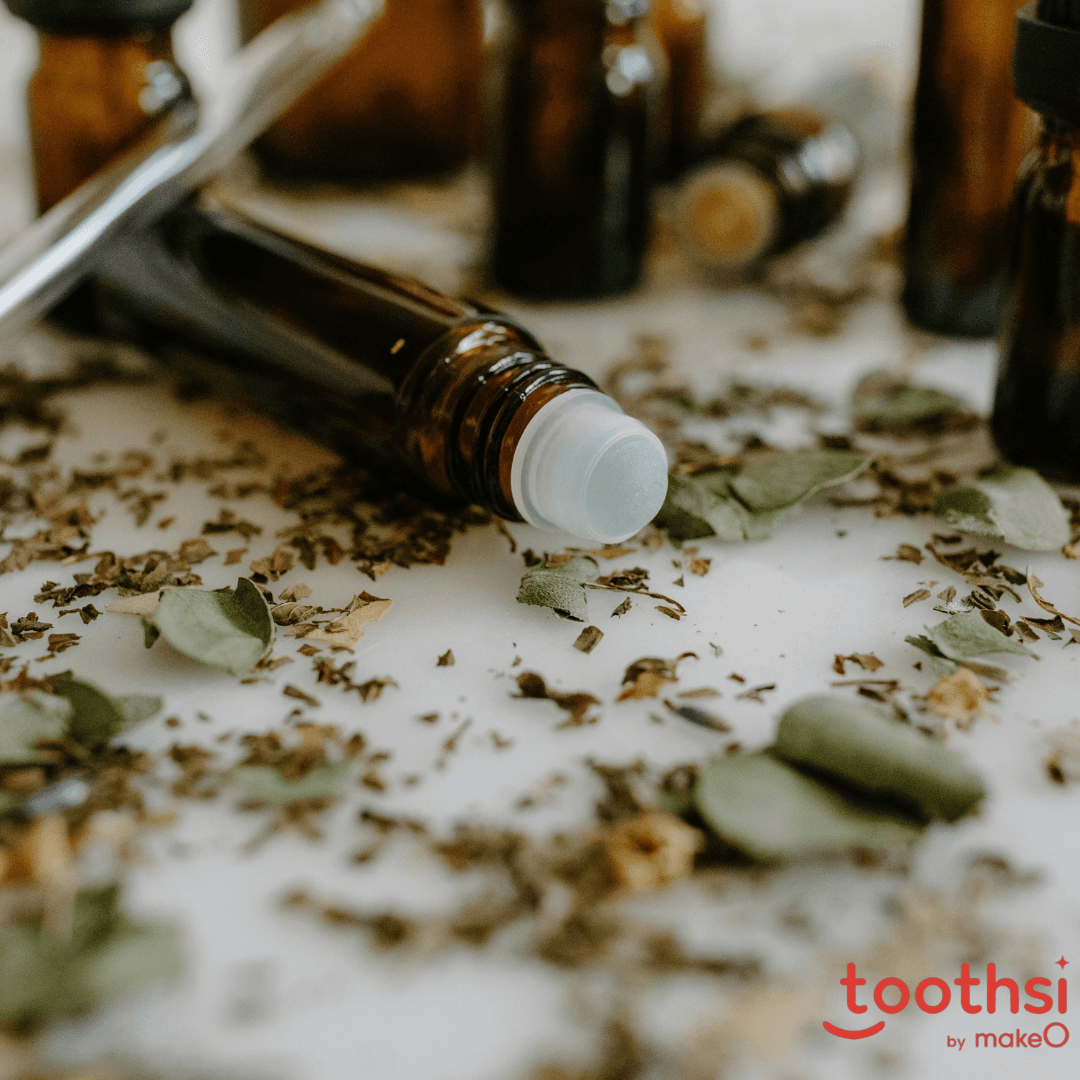MakeO blog
Clove oil, extracted from the dried flower buds of the clove tree, has been used for centuries in both culinary and medicinal applications. Cloves, known for their strong, aromatic flavour, are rich in essential oil, particularly eugenol, which gives them their powerful therapeutic properties. Indigenous to Indonesia's Spice Islands, cloves are now cultivated in various parts of the world, including India and Madagascar. Clove oil is especially useful for dental care because it can help relieve pain and kill bacteria. Beyond dental health, it can also soothe coughs, colds, and sore throats, aid digestion, reduce inflammation, and act as a natural insect repellent. However, it is important to use it carefully, as sometimes it causes irritation or harm.
In this blog, we’ll explore clove oil’s benefits for dental health, its uses for common dental issues, and tips for using it with transparent aligners.
Is clove oil beneficial and safe for dental health?
Clove oil is widely recognized for its effectiveness in addressing various dental issues, primarily due to its active ingredient, eugenol. Eugenol has powerful pain-relieving and numbing properties, making it effective for soothing toothaches.
When you apply clove oil to a painful tooth or gum, it works by temporarily blocking the nerves from sending pain signals to your brain, much like how a local anesthetic works. Also, eugenol also has anti-inflammatory properties, meaning it can reduce swelling and irritation in your gums or around an infected tooth. This is particularly helpful if you're dealing with conditions like conditions causing pain and sensitivity in teeth.
Clove oil’s ability to kill bacteria adds another layer of protection. It can help clear out harmful bacteria in your mouth, which often cause infections and contribute to dental problems like cavities and gum disease.
While eugenol is effective, it’s important to use clove oil carefully. In some cases, it might cause mild irritation or sensitivity, particularly with prolonged use. Therefore, it's wise to use it as directed and if you have any concerns, always consult a dental professional.
Common dental conditions in which clove oil is useful
As discussed, clove oil is beneficial for its natural pain relief, anti-inflammatory, and antibacterial properties. Here are some common dental conditions where clove oil is often used:
- Toothache: Clove oil is well-known for easing tooth pain and pulpitis (inflammation of the tooth's inner part). It contains eugenol, a compound that numbs the pain, providing relief from sharp, throbbing discomfort.
- **Dental Plaque: **Plaque a thin layer of bacteria that forms on teeth and leads to tooth decay and gum disease. Clove oil, due to its antimicrobial effects, helps inhibit plaque deposition and keep good oral health.
- Periodontal Disease: Clove oil can fight bacteria that cause gum disease (periodontal disease). It helps clean the affected area and control bacterial growth in combination with periodontal therapy for the management of gum conditions like gingivitis.
- Endodontic Treatment: In root canal procedures, clove oil is mixed with zinc oxide to create a temporary filling or protective cover for the tooth. This helps in treating cavities and protecting the tooth’s inner part during the procedure.
- Dentures: Rubbing clove oil on your gums before putting in dentures can numb the area and reduce discomfort from new or poorly fitting dentures.
- **Halitosis/ Bad Breath: **Halitosis, or bad breath, is common and often results from bacteria producing unpleasant smells. Clove oil can temporarily freshen breath by targeting these bacteria. For over 2,000 years, cloves have been used to help improve breath.
Clove oil is a great natural solution for good oral health. Its numbing and antibacterial effects can help with tooth pain, gum disease, and discomfort from dentures. But remember, clove oil provides only symptomatic relief in dental issues like cavities and pulpitis and treating the offending tooth is imperative for long-term relief and to prevent further infection.
Using clove oil with transparent aligners safely
Clear aligners are a modern orthodontic tool made from transparent plastic. They straighten teeth discreetly by applying gentle pressure to gradually move your teeth into the correct position. During the initial phase of treatment, you might experience some soreness of gums due to the pressure of the aligners. Clove oil can be beneficial as it numbs the affected area and alleviates discomfort.
However, applying oil can also cause staining of your aligners. To prevent discoloration, make sure to remove your aligners before applying clove oil and clean them thoroughly afterward. This will help avoid any residue that might affect their appearance.
You can use a cotton swab to apply clove oil directly to sore gums or mix a few drops with olive oil and massage it gently. Repeat this process 2-3 times a day but avoid overuse to prevent mouth irritation.
Considering transparent aligners cost, it is essential to care for them properly. Avoid staining by following these simple tips and maintaining good hygiene practices with your aligners.
Conclusion
Clove oil is a valuable tool for dental health, offering pain relief, reducing inflammation, and fighting bacteria. It’s particularly useful for toothaches and gum issues. However, it’s important to use it carefully especially when using transparent aligners. By following proper application techniques and maintaining good oral hygiene, you can enjoy the benefits of clove oil while keeping your aligners in good shape.
Related articles

Types of Braces: Removable vs Fixed Braces, Which is Right For You?

This Diwali, Smile Bright With makeO Teeth Whitening Kit

Dr. Pravin Shetty: Pioneer in Lingual Orthodontics & Innovative Smile Solutions
How do I Know I’m the Right Candidate for makeO toothsi Teeth Aligners?

